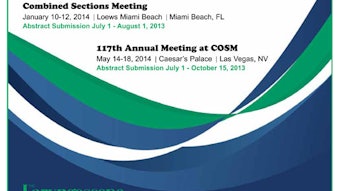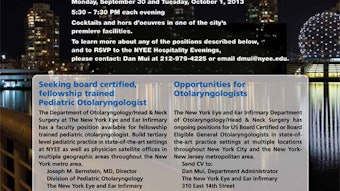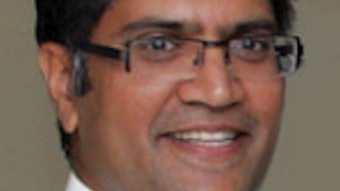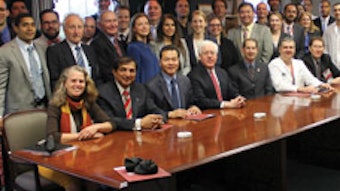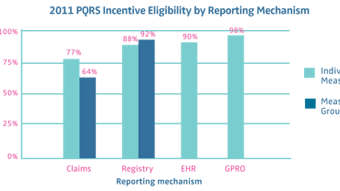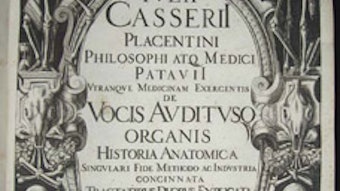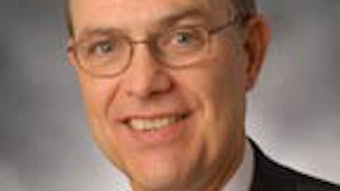ENTs Respond to Boston Marathon Tragedy
James L. Netterville, MD AAO-HNS/F President Several healing months have passed since the sad events of April 15, in Boston during its annual marathon and celebration of Patriots’ Day. We are proud of all of our members who responded with compassion and professionalism, demonstrating strength and grace in the middle of tragedy. Like many of us, Daniel J. Lee, MD, associate professor, Dept. of Otology and Laryngology, Harvard Medical School and director, Pediatric Ear, Hearing and Balance Center, MEEI, is used to long days. He has a busy surgical practice and sees a variety of pediatric and adult patients primarily with ear and skull base disorders. Gregory W. Randolph, MD, let the Academy know of the involvement of Dr. Lee and some residents, including Alicia M. Quesnel, MD, in the treatment of the injured that day. Dr. Lee kindly shared a glimpse of that experience with the Bulletin. He prefaced his account saying that neither he nor any of the staff members had personally experienced an emergency situation of this level before. Dr. Lee: We saw a few patients on the evening of the Marathon Monday bombing at Mass. Eye and Ear in our subspecialty emergency department, but our otolaryngology residents saw a number of victims as inpatient consults that evening and during the ensuing days. These patients were initially stabilized in several large general hospitals in Boston affiliated with the Harvard Medical School—Mass General Hospital, Brigham and Women’s Hospital, Beth Israel-Deaconess Hospital, and Children’s Hospital. As a group we have seen more than 60 patients since the events of April 15. A few patients had larger tympanic membrane perforations and moderate conductive hearing loss. In some, a sensorineural hearing loss component was found in the ear closest to the blast. Bulletin: What injuries were you treating, and what was the range of seriousness? Dr. Lee: Most patients presented with mild conductive hearing loss and small tympanic membrane perforations that we would predict should heal spontaneously with hearing recovery to baseline. We recommended steroids for many of our patients seen early after the bombing to help reduce the risk of permanent damage to the inner ear given the intensity of the acoustic exposure. This came at the recommendation of our military otologic colleagues who use steroids to help blast injury victims in the field. We also used a small paper patch over the tympanic membrane perforation when patients were seen in our otology clinic to help facilitate the healing process. Bulletin: What about the patients who had other wounds, but needed otolaryngic care and could not be sent to you…did your hospital confer on them as well? Dr. Lee: We have otologists and otolaryngology residents in all of the Harvard-affiliated hospitals, as well as the other teaching hospitals in Boston where victims were sent and so patients received specialty care at their respective institutions. Bulletin: In an explosion like that, would some patients face permanent hearing damage or loss? Dr. Lee: Most patients we have seen have a mild conductive hearing loss and small tympanic membrane perforations that will resolve spontaneously. Other patients presented with a sensorineural hearing loss with or without perforation and some of these patients will have a permanent threshold shift given the hair cell injury associated with acoustic trauma. Bulletin: What other kinds of long-term issues would need ENT care? And, have you seen many patients since that day who have realized they have hearing loss or other injuries? Dr. Lee: The patients needing long-term care are those with large tympanic membrane perforations that will not heal on their own and require tympanoplasty surgery. Other patients will have a permanent sensorineural hearing loss and will likely have interval testing to determine if the hearing loss remains stable or progresses. In most cases, the hearing will stabilize over time. Bulletin: What was the biggest eye-opener into changes you will make at your clinic in emergency planning? Dr. Lee: Thankfully none. Many otolaryngology and ophthalmology residents and staff volunteered their time to stay at the hospital to help care for these victims on Monday night. We are very fortunate to have a critical mass of specialists at MEEI and our affiliated institutions and importantly, our audiology colleagues are always on call after hours for any emergency consults requiring hearing testing or intraoperative monitoring. Read more online exclusive coverage of the Boston Bombing by Alicia Quesnel, MD, and Aaron K. Remenschneider, MD, at www.entnet.org/Bulletin (member login required).Link to a CBS report of Drs. Lee and Member, Jo Shapiro, MD, Chief, Division of Otolaryngology, and Director, Center for Professionalism and Peer Support Brigham and Women’s Hospital.
AAO-HNS/F President
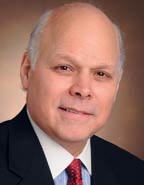 James L. Netterville, MD AAO-HNS/F President
James L. Netterville, MD AAO-HNS/F PresidentSeveral healing months have passed since the sad events of April 15, in Boston during its annual marathon and celebration of Patriots’ Day. We are proud of all of our members who responded with compassion and professionalism, demonstrating strength and grace in the middle of tragedy.
Like many of us, Daniel J. Lee, MD, associate professor, Dept. of Otology and Laryngology, Harvard Medical School and director, Pediatric Ear, Hearing and Balance Center, MEEI, is used to long days. He has a busy surgical practice and sees a variety of pediatric and adult patients primarily with ear and skull base disorders. Gregory W. Randolph, MD, let the Academy know of the involvement of Dr. Lee and some residents, including Alicia M. Quesnel, MD, in the treatment of the injured that day.
Dr. Lee kindly shared a glimpse of that experience with the Bulletin. He prefaced his account saying that neither he nor any of the staff members had personally experienced an emergency situation of this level before.
Dr. Lee: We saw a few patients on the evening of the Marathon Monday bombing at Mass. Eye and Ear in our subspecialty emergency department, but our otolaryngology residents saw a number of victims as inpatient consults that evening and during the ensuing days.
These patients were initially stabilized in several large general hospitals in Boston affiliated with the Harvard Medical School—Mass General Hospital, Brigham and Women’s Hospital, Beth Israel-Deaconess Hospital, and Children’s Hospital. As a group we have seen more than 60 patients since the events of April 15.
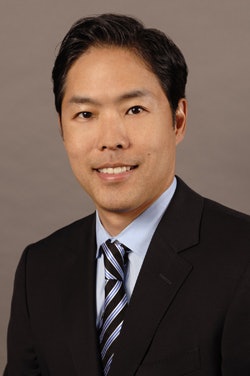 Daniel J. Lee, MD, Associate Professor, Dept. of Otology and Laryngology, Harvard Medical School and Director, Pediatric Ear, Hearing and Balance Center, MEEI
Daniel J. Lee, MD, Associate Professor, Dept. of Otology and Laryngology, Harvard Medical School and Director, Pediatric Ear, Hearing and Balance Center, MEEIA few patients had larger tympanic membrane perforations and moderate conductive hearing loss. In some, a sensorineural hearing loss component was found in the ear closest to the blast.
Bulletin: What injuries were you treating, and what was the range of seriousness?
Dr. Lee: Most patients presented with mild conductive hearing loss and small tympanic membrane perforations that we would predict should heal spontaneously with hearing recovery to baseline.
We recommended steroids for many of our patients seen early after the bombing to help reduce the risk of permanent damage to the inner ear given the intensity of the acoustic exposure. This came at the recommendation of our military otologic colleagues who use steroids to help blast injury victims in the field.
We also used a small paper patch over the tympanic membrane perforation when patients were seen in our otology clinic to help facilitate the healing process.
Bulletin: What about the patients who had other wounds, but needed otolaryngic care and could not be sent to you…did your hospital confer on them as well?
Dr. Lee: We have otologists and otolaryngology residents in all of the Harvard-affiliated hospitals, as well as the other teaching hospitals in Boston where victims were sent and so patients received specialty care at their respective institutions.
Bulletin: In an explosion like that, would some patients face permanent hearing damage or loss?
Dr. Lee: Most patients we have seen have a mild conductive hearing loss and small tympanic membrane perforations that will resolve spontaneously. Other patients presented with a sensorineural hearing loss with or without perforation and some of these patients will have a permanent threshold shift given the hair cell injury associated with acoustic trauma.
Bulletin: What other kinds of long-term issues would need ENT care? And, have you seen many patients since that day who have realized they have hearing loss or other injuries?
Dr. Lee: The patients needing long-term care are those with large tympanic membrane perforations that will not heal on their own and require tympanoplasty surgery. Other patients will have a permanent sensorineural hearing loss and will likely have interval testing to determine if the hearing loss remains stable or progresses. In most cases, the hearing will stabilize over time.
Bulletin: What was the biggest eye-opener into changes you will make at your clinic in emergency planning?
Dr. Lee: Thankfully none. Many otolaryngology and ophthalmology residents and staff volunteered their time to stay at the hospital to help care for these victims on Monday night. We are very fortunate to have a critical mass of specialists at MEEI and our affiliated institutions and importantly, our audiology colleagues are always on call after hours for any emergency consults requiring hearing testing or intraoperative monitoring.
